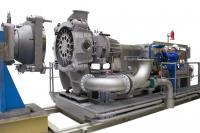plasticker-News
| 2010-01-19 |

|
Coperion: Successful high-capacity compounding of polyolefins
|
New underwater pelletizing system for PP; two-stage ZSK NT for bimodal HDPE With several recently supplied and installed high-capacity compounding lines, both the latest UG underwater pelletizing systems from Coperion GmbH, Stuttgart/Germany, and this company’s concept of two-stage PE compounding with the ZSK NT have more than proved themselves in actual practice: • Equipped with the new UG 925 underwater pelletizer, a ZSK compounder that went into service in Saudi Arabia at the beginning of 2009 for the compounding of polypropylene (PP) achieves an output of 72 tonnes/hour. When it comes to increasing the output capacity of a ZSK compounder for PP, the die plate plays a very important role. Since PP melt is more tacky than PE melt and its viscosity range is wider, the hole spacing must be larger and the passage of the melt longer. This in turn increases the pressure requirement for the pelletizing operation. Thus a twin-screw compounding extruder with a 380 mm screw diameter (ZSK 380) is used which is capable of building up the necessary pressure without any support from a melt pump. The ZSK 380 is currently the largest model of the ZSK series and there are already fourteen of them giving reliable service worldwide – though the screw speed and the 18.5 MW drive output of the above mentioned compounder in Saudi Arabia are higher than of those compounders manufactured hitherto. The Suprex planetary gear box for the screw drive permits variation of the screw speed and hence optimization of the compounding process. • 55 tonnes/hour is the output capacity of each of two ZSK NT compounders likewise supplied to Saudi Arabia for the particularly demanding compounding of bi-modal and multi-modal high-density polyethylene (HDPE). The two-stage ZSK NT was conceived by Coperion specially for the compounding of such PE grades, which were developed only a few years ago and unite high strength and high stress cracking resistance. In the first stage, a ZSK 320, the material is melted. In the second stage, a ZSK 380, the relatively low screw speed ensures a long residence time and hence the high degree of homogenization necessary for this particular material. Two smaller ZSK NT compounders – equipped with 250/320 and 250/350 mm diameter screws respectively – have already been giving successful service since the end of 2008. Both the concept of the high-capacity underwater pelletizer and that of the ZSK NT compounder have met customers’ highly demanding requirements. Both concepts have been welcomed as important developments that underscore Coperion’s technological leadership. With further developments in the pipeline, the output target of 100 tonnes/hour for the compounding of polyolefins is now within reach. Among the extraordinary engineering challenges posed by the development of these high-capacity compounding systems were the design of components using FEM-methods and the handling and precision machining of large and heavy metal parts. Coperion’s success in meeting these challenges was due to this company’s expertise and experience gained in the development and production of countless compounding systems with small to medium capacity. More Information: www.coperion.com |
Coperion GmbH, Stuttgart, Germany
 back to news list back to news list |  back to top back to top |












